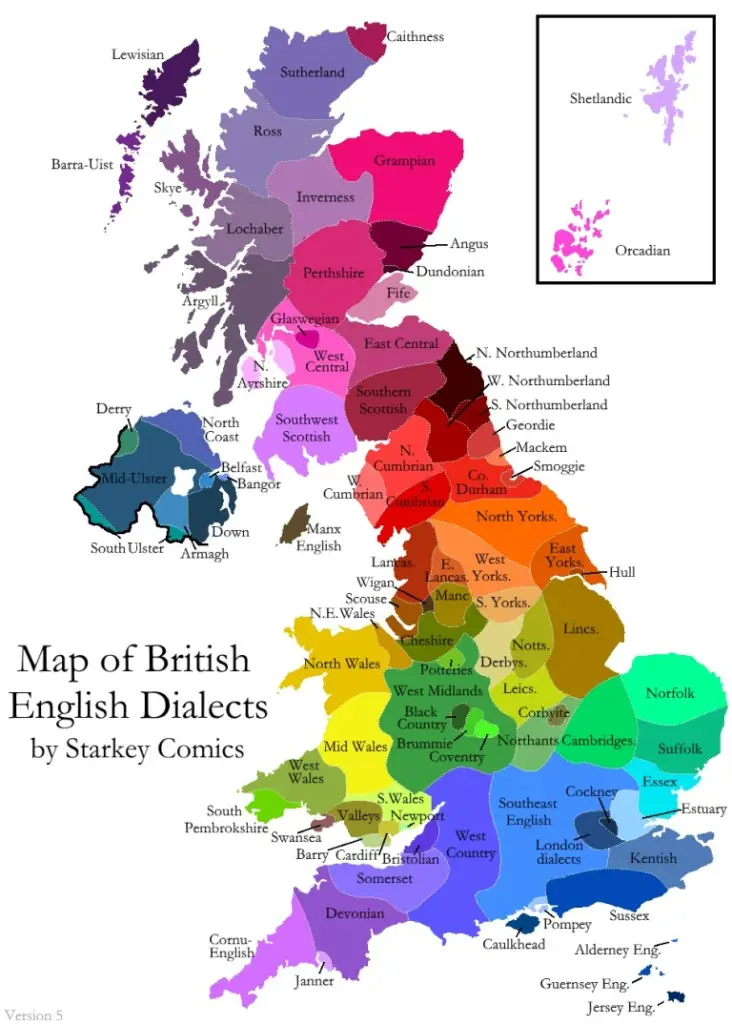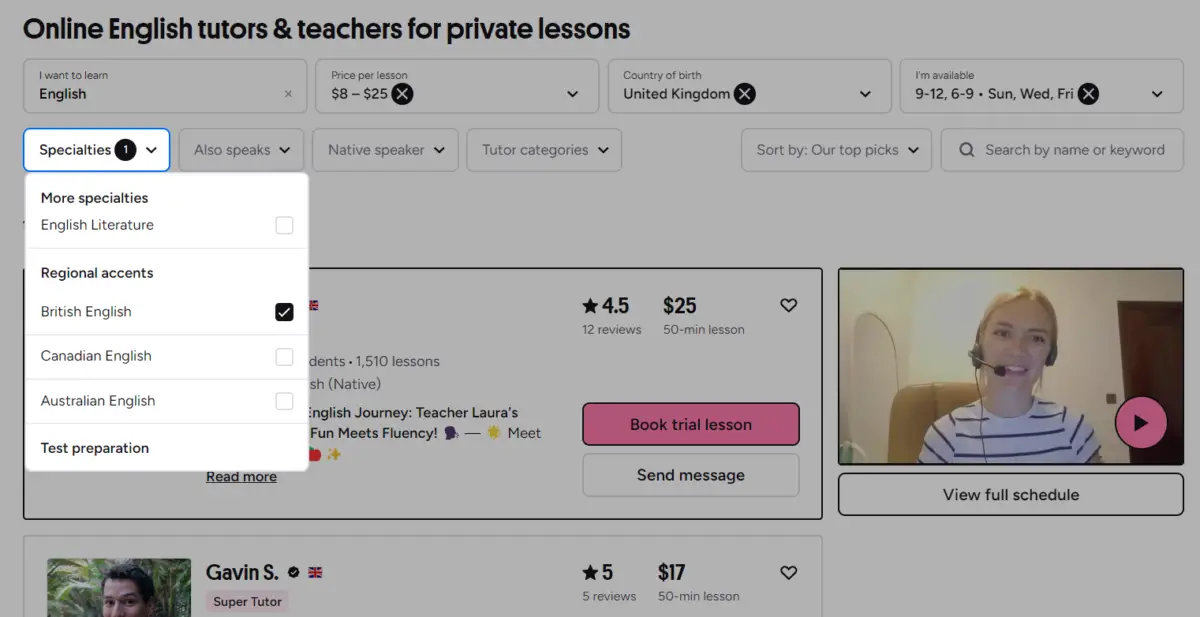Many English learners aspire to speak with a British accent, whether it’s because they want to work in the UK or they just like the way it sounds.
But it can be tricky to learn British English, especially when the world is dominated by American media and pop culture.
This guide covers helpful information and practical resources for British English learning, including:
- Where to study British English
- How to learn a British English accent
- Websites, apps, and podcasts to help improve your British English fluency
- Important differences between American and British pronunciation, words, spelling & more
What is British English?
We should first be clear that ‘British English’ is not a language in itself, nor is there a single ‘British accent’.
When we talk about British English, we mean a collection of variants of the English language – including differences in accents and colloquialisms – spoken by people from the British Isles. This includes English, Welsh, Scottish, and Northern Irish accents.
As you can see from the amazing map below, there is great diversity in dialects across the UK. If you ever travel around the country, you will experience this for yourself!

Why learn British English?
Many would argue that British English is the original form of English – the language originated in England, after all. They may be surprised to know that the way Brits spoke in Shakespeare’s time is closer to modern American English than to how Brits speak today.
There are many benefits to learning English, whichever version you choose. Some specific benefits of learning British English include:
- Sounding more natural if you are living and working in the UK
- Sounding more formal (according to some people)
- A better appreciation of British humor
- Understanding British slang, idioms, and other colloquialisms

8 Ways to learn British English
There are more ways to learn British English than ever, including online platforms, apps, podcasts, and language exchanges.
You certainly don’t need to travel to the UK to be exposed to British accents regularly, so take a look at some of these ideas and see which ones will work best for you.
1. Find a tutor with a British accent
Maybe the best way to learn British English, although not the cheapest, is to take lessons with a British tutor.
With this kind of 1-on-1 help, you can fast-track your language learning journey and receive personalized feedback on your accent, intonation, and word choice. By listening to a native speaker in your lessons, you’ll improve your understanding of how each word is pronounced and how words flow together naturally when they talk.
Your tutor will also assess your written English through various assignments and make sure you are using British spelling and grammar.
Some good platforms to find a British tutor are:
- Preply: Search thousands of qualified British English tutors with different specialties and rates starting from around $8 for 50 minutes. Find one available at a time and price that suits you with 50% off your first lesson.
- British Council: A world-renowned British English course with 24/7 lesson access and excellent supporting materials. Flexible pricing options and a choice of private or group classes. Try free for 1 week or read our full review of British Council’s English Online courses.

If you can’t afford live lessons like this, a more affordable alternative is a pre-recorded British English course like these ones on Udemy:
These have individual modules on how different vowels and consonants sound, as well as things like the glottal stop, intonation, stress, and common mistakes that people make when they are used to an American accent.
2. Learn about different British accents and practice using them
We’ve already mentioned that there is no single ‘British accent’. If you want to learn British English, it’s important to understand the different accents you’ll hear while speaking to British people.
Received Pronunciation (RP) is the accent that many foreigners consider to be quintessentially British. This is a standard, formal accent often associated with upper and middle-class speakers in Southern England. It’s also referred to as ‘BBC English’ or the ‘Queen’s English’.
Udemy course Master English Pronunciation (RP or ‘BBC English’) can help you learn a British accent with Received Pronunciation.
Another common English accent is Estuary English, which combines certain features of RP and Cockney. This originated in London, around the River Thames, but has spread out to Southeast England and other parts of the country. You can hear this accent from comedian Ricky Gervais and chef Jamie Oliver.
Other English accents influenced by local languages and geography include ‘Scouse’ in Liverpool, ‘Geordie’ in Newcastle, and ‘Brummie’ in Birmingham. Then, there are different regional Welsh, Scottish, and Northern Irish accents to consider.
Even some Brits from different parts of the country struggle to comprehend each other, so it can be even harder for non-native speakers to decipher a strong regional British accent.
3. Use language learning apps with a British English option
Apps are a convenient way to learn English, but they don’t all have the option to focus on British English.
Two language apps that will let you learn British English online are Mondly and Gymglish.
Mondly
Language learning app Mondly has separate options for American and British English courses, so you can pick whichever you prefer.
Work through the lessons at your own pace and receive teaching in your native language – something that sets Mondly apart from other apps.
You can try Mondly for free, but we recommend purchasing the premium version to make the most of your study time. Check special offers here.
Gymglish
Gymglish uses AI technology to customize every lesson according to your level and past performance. This improves the effectiveness of your course and makes the content more relevant.
When you sign up with Gymglish, you get to choose your learning preferences, including whether you would like to focus on British or American language.
The main character in the story that runs through the lessons is American, but if you select a preference for British English you will have more British audio in your lessons, as well as British spelling and grammar.
Try Gymglish free for 1 month or learn more in our full review of Gymglish for more information.

4. Discover British slang and idioms
To truly appreciate British English, you need to expand your vocabulary to include idioms and slang terms that may not be taught in even the best English courses.
This list of British idioms is a good resource, but here are a few to get you started:
- Chuffed to bits: Very happy or pleased
- Full of beans: Active and energetic
- Have a gander: Have a look
- Curtain twitcher: A nosy person who spies on their neighbors
British English is full of colorful slang terms that only make sense if you grew up in the UK or you have watched plenty of British TV shows. For example:
- Bonkers: Crazy
- Daft: Silly
- Trollied/plastered/pissed/sozzled/hammered: Drunk
- Leg it: Run away
- Budge up: Move over
- Cream-crackered: Exhausted or very tired (Cockney rhyming slang for ‘knackered’)
- Gaff: Home
- Miffed: Irritated or annoyed
- Wangle: To attain something through cunning means
It’s good if you can recognize these words when you hear other people using them. But be careful using them yourself, as they are generally only appropriate for informal situations.
5. Watch British TV shows and films
Chances are you already hear some British English in the films and TV shows you watch. Here are some of our recommendations, which contain predominantly British accents and may teach you a little about British culture, as well as the language:
TV shows:
- Sherlock
- The Office (the original British version)
- Downton Abbey
- The Crown
- The IT Crowd
- Doctor Who
- Black Mirror
- Taskmaster
- Motherland
Films:
- The King’s Speech
- Love Actually
- Paddington
- Notting Hill
- Bridget Jones’s Diary
- Billy Elliot
- This Is England
- 28 Days Later
- Harry Potter (series)
- James Bond (series)
Here are some tips to help you learn British English as you enjoy these shows and movies:
- Use subtitles if needed, but aim to progress from subtitles in your native language, to subtitles in English, to no subtitles at all.
- Research key actors to discover more about their accent and why they pronounce certain words differently from other people.
- Keep a notepad handy to write down any new words and phrases you hear, then look up their meaning and try to use them when you speak.
- Practice saying a line from the show, record yourself, and play it back to compare your accent to the original.
- Enjoy British humor, which includes puns, satire, sarcasm, and irony. If you don’t get why something is funny, make a note of it and ask your tutor or a trusted friend.
6. Listen to British podcasts and radio
If you want to practice British English on the go, try listening to some podcasts and radio shows.
When it comes to British radio, the BBC is king, and you can listen to most of their shows from anywhere in the world using BBC Sounds. This includes a wide variety of British podcasts made for the general population (not specifically for English learners).
Some good podcasts for learning British English include:
- Podcasts in English
- LearnEnglish Podcast from British Council
- The English We Speak (BBC)
- Learning English Drama (BBC) – good for regional British accents
Learning English with podcasts works better if you are able to make notes as you listen and complete any accompanying exercises. But even if you can only listen while you drive to work or go for a run, you’ll still be building your English skills.

7. Immerse yourself in the language
Learning English through immersion means surrounding yourself with the language in your everyday life. The more you hear and read it, the easier it becomes for you to understand it and use it yourself.
We have already mentioned some ways to immerse yourself in British English with podcasts, radio, and videos, but here are some other ideas:
- Switch your phone language to British English (as well as any other devices you use)
- Listen to songs by British artists such as Coldplay, Adele, Kate Nash, Blur, and The Kinks
- Read the news to learn English, focusing on British sites like BBC News
- Find a British conversation partner (see below)
- Watch British video content on YouTube about topics that interest you
8. Practice speaking English with Brits
If you have any British friends, be sure to talk to them regularly. Ask if they will help you improve your British accent and point out any non-British words or phrases you are using.
Don’t worry if you don’t personally know any British people; you can meet some online using a language exchange.
These platforms let you find conversation partners who speak the language you want to learn. In return, you help them learn your native language.
Check out some of the best language exchanges for learning English, and don’t forget to specify that you want to learn British English when you sign up.

Key differences between British and American English
It’s important to grasp the differences between British and American English if you want to be able to choose the correct one in any situation.
We have already mentioned pronunciation and accent, but here are some other key differences you’ll need to learn about:
Vocabulary
Differences in British vs American words can catch people out and cause misunderstandings. Sometimes, the same word has a different meaning for Brits and Americans.
Consider whether to use the word ‘trash’ vs ‘rubbish’, ‘pants’ vs ‘trousers’, ‘rubber’ vs ‘eraser’, and ‘coriander’ vs ‘cilantro’ – to name just a few examples.
In professional settings, British English tends to be more formal, using words like ‘shall’, whereas American English is more casual, leaning towards ‘will’ or ‘should’, depending on the context.
Grammar
British and American grammar differences are more subtle but relate to things like tenses, prepositions, and contractions.
Brits might say ‘needn’t’ whereas Americans favor ‘don’t need to’, for instance. ‘At the weekend’ and ‘different to’ are more British, compared to the American ‘On the weekend’ and ‘different from’.
Spelling
The rules for British and American spelling are fairly easy to follow. They include:
- or vs our (color/colour)
- -ize vs -ise (memorize/memorise)
- -er vs -re (center/centre)
- -og vs -ogue (dialog/dialogue)
And a few others that you can read about in the article linked above.
Punctuation and formatting
Did you know that we even write dates differently? May 6th, 2024 would be written as 06/05/2024 in the UK and 05/06/2024 in America.
Even punctuation has its differences, although these are unlikely to cause any serious confusion if you get them wrong. For example, Brits and Americans have different conventions concerning the use of quotation marks.
Find out more about learning American English here.
Summary
If you want to learn English like a Brit and master a British accent, you’ll definitely need to spend some time in conversation with Brits – perhaps a private tutor, a conversation partner, or just a good friend.
You can supplement this with plenty of time watching or listening to British media, paying attention to the words, accent, and humor used.
A language app is also a good addition to your studies, making learning English more fun and giving you daily practice and feedback.
Finally, don’t forget to set some English learning goals so you can measure the effectiveness of your efforts and track your progress.
FAQs
What is the website to learn British English?
One website where you can learn British English for free is the LearnEnglish website by British Council. It offers a variety of materials such as texts, audio recordings, and videos at different levels.
How do I start speaking in British English?
Start speaking in British English by mimicking native speakers, paying attention to pronunciation, intonation, and rhythm. Learn English with a language tutor or participate in local language exchange programs to refine your accent and language skills.
How can I improve my British English pronunciation?
To improve your British English pronunciation, try watching British TV shows and films, listening to British music and podcasts, and practicing with native speakers. These activities can help you understand and practice the unique sounds, intonation, and stress patterns of British English.




